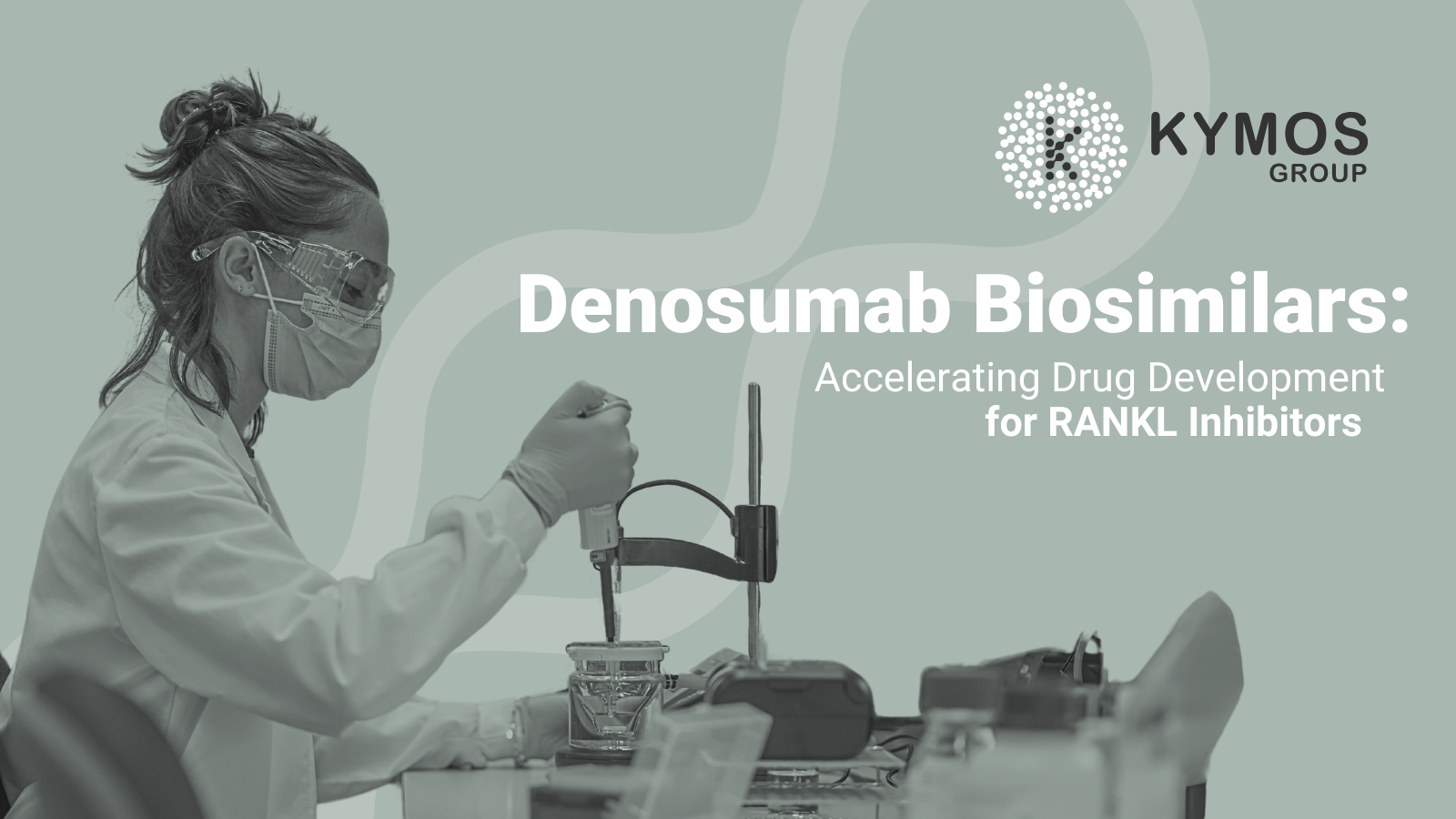
Denosumab represents one of the leading biologics applied today in various diseases of bones: treatment and prevention of osteoporosis, bone metastases, and other skeletal disorders. Its success in improving patient health has made it one of the most impactful therapies in its field.
With the growth of the biosimilar market in recent years and its patent expiration dates, it has become a prime target for developing and releasing new biosimilar applications. In this article, we explore the importance of denosumab as a RANKL inhibitor and how Kymos Group can assist biosimilar developers through rigorous and precise characterization, comparability studies, and batch testing and release for new market applications.
Introduction to Denosumab: a RANKL inhibitor
Denosumab is a fully human monoclonal antibody (mAb) that works by inhibiting RANKL or receptor activator of nuclear factor kappa-Β ligand, a key regulator of bone metabolism. RANKL plays a vital role in the differentiation and activation of osteoclasts, the cells responsible for bone resorption, which is the process by which the body breaks down old or damaged bone cells.
By binding to RANKL, denosumab prevents its interaction with the RANK receptor on osteoclasts, thereby inhibiting their activation and reducing the bone resorption process. This mechanism makes denosumab an effective treatment for diseases characterized by excessive bone loss.
Denosumab’s therapeutic applications include the management of osteoporosis and the prevention of skeletal-related events in cancer patients with bone metastases. Inhibiting the resorption of bone, denosumab increases bone density and strength in patients with osteoporosis and significantly reduces fracture risk. For cancer patients, denosumab has been reported to help reduce complications such as fractures, spinal cord compression, and the need for radiation therapy, improving and enhancing overall quality of life.
Denosumab has a half-life of approximately 26 days and provides sustained and systemic effects, allowing for less frequent dosing. For osteoporosis, it is typically administered subcutaneously every six months, while for other conditions, such as bone metastases, the dosing interval may be more frequent (every 4 weeks).
Denosumab Biosimilars Development
Denosumab was first developed by Amgen and received its FDA approval to treat osteoporosis in 2010, becoming the first-ever approved RANKL inhibitor by this agency. It was also approved by the EMA for medical use in the European Union shortly after.
This monoclonal antibody is available in two different and approved formulations, mainly differing by dosing interval (as stated) and dosing quantities: 120mg for the cancer indication and 60mg for osteoporosis. Until last year, these original versions of denosumab were the only available market options.
This situation has changed, and in 2024, the FDA and EMA approved the first biosimilars of denosumab. This approval is the first step in expanding treatment options for patients needing RANKL inhibition. These biosimilars are designed to provide comparable efficacy and safety, while potentially improving access to treatment and lowering costs for patients.
With the introduction of biosimilars, there is now the opportunity for easier access to this important therapy, especially as healthcare systems are globally searching for how to manage the increasing demand for biologic treatments.
Kymos Group’s experience with Denosumab
Detailed analytical studies need to be performed to compare the biosimilar with the reference product in terms of structure and function, along with preclinical and clinical trials to confirm similar safety, efficacy, and immunogenicity profiles.
Kymos Group can assist biosimilar developers of denosumab and other monoclonal antibodies involving different mechanisms of action through multiple stages of biosimilar development, including characterization and comparability, quality control, and clinical comparability studies.
Characterization and Comparability studies
For characterization and comparability studies, we offer an extensive catalog of cutting-edge analytical techniques alongside significant experience in their application to biosimilars. Our Biopharmaceutical and Immunology departments have extensive experience with:
- Structural analysis techniques to determine different features such as intact mass, sequence, disulfide bonds, post-translational modifications, glycosylation, and monosaccharide profile, etc. (LC, GC MS/MS, MALDI-TOF analysis)
- Conformational analysis (Circular Dichroism, ultraviolet, fluorescence,e and infrared spectroscopy)
- Biological activity (Binding assays, potency assays, and affinity)
Quality control for Biosimilars
Kymos Group has gained extensive experience in the analyses most commonly requested by regulatory authorities for a wide range of monoclonal antibody biosimilar products, available in various dosage forms and delivery devices.
We currently handle routine batch testing for several biosimilars and have successfully completed the transfer for additional ones. Our highly qualified team is also committed to supporting clients with the timely release of these products.
Some of the monoclonal antibody biosimilars that we have in routine batch testing are:
| Infliximab | Rituximab | Trastuzumab | Adalimumab | Bevacizumab |
| Regdanvimab | Ustekinumab | Ranibizumab | Omalizumab |
Clinical Comparability Studies
Kymos Group provides bioanalytical support for comparability studies, covering activities like/plasma serum level measurement of both reference and biosimilar proteins using ELISA and ECLA, PK calculations and statistics, and immunogenicity studies.
Conclusions
The release and approval of denosumab biosimilars are of vital importance for expanding access to RANKL inhibitor therapies that are more affordable and accessible compared to the originator product. With the growing demand for biologic treatments in recent years, these biosimilars represent significant opportunities for diverse patient populations.
Kymos Group’s extensive experience and expertise in the various analyses involved in the development of biosimilars, including denosumab, ensure that manufacturers and developers can rely on a partner committed to precision, safety, and adherence to regulatory requirements. This ultimately supports the delivery of safe, effective, and high-quality treatments to the market.
If you require assistance with your biosimilars or any of your CMC or bioanalytical studies, please do contact us or send us an email to commercial@kymos.com

